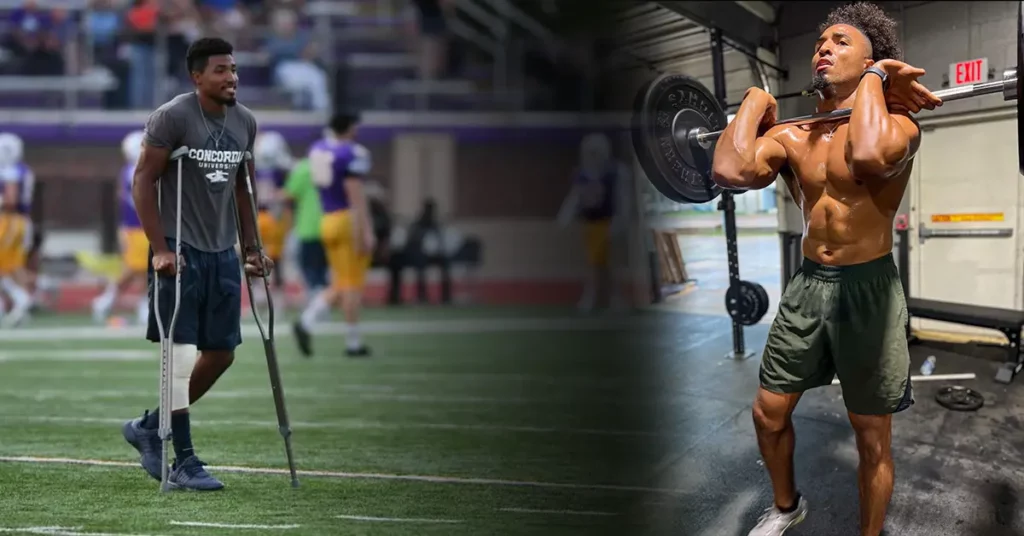Life can change in an instant. For athletes and fitness enthusiasts, an injury isn’t just a physical setback—it can feel like the end of a dream. If you’ve ever faced a challenge that made you question your future, you’ll relate to this story.
This blog explores my personal journey: six knee surgeries, countless hours of rehab, and the battle to turn a devastating setback into a comeback. Whether you’re recovering from an injury or looking for inspiration, this story is proof that resilience can rebuild your life—and even change it for the better.
The Injury That Shattered My Plans
It was July 19, 2019, a day that would change my life. I planted my foot, twisted, and heard the unmistakable “pop.” I knew immediately something was wrong. The diagnosis? A torn ACL, MCL, and meniscus—the dreaded “unhappy triad.”
The first week was a blur of pain and uncertainty. I couldn’t move, couldn’t train, and couldn’t stop thinking about the long road ahead. Questions swirled in my head:
- Would I ever play again?
- Could I recover fully?
- What would this mean for my future?
Injuries like these don’t just take a toll on your body—they attack your confidence and mental health. Missing a sports season felt like watching my dreams slip away.
Learn more about ACL injuries and their impact from the Mayo Clinic.
Rehab Before Surgery: Laying the Foundation
Recovery started even before the surgery. My physical therapy routine became a full-time job, with sessions twice a day. The focus was on reducing inflammation, improving range of motion, and strengthening my leg.
Why Pre-Surgery Rehab Matters:
- Reduces Swelling: Less swelling means fewer complications during surgery.
- Improves Flexibility: Increases post-surgery mobility.
- Builds Strength: Stronger muscles support faster recovery.
This wasn’t just about preparing for surgery; it was about mentally preparing for the fight ahead. Every stretch, every exercise was a small step toward regaining control.
Learn about the benefits of pre-surgery rehab from the American Academy of Orthopaedic Surgeons.
The Post-Surgery Battle: Pain, Swelling, and Perseverance
The surgery was only the beginning. Post-operation recovery was grueling. Pain and swelling became my constant companions, and every movement felt like a challenge.
What Recovery Looked Like:
- Pain Management: Ice packs, elevation, and medication were daily rituals.
- Physical Therapy: Twice-daily sessions pushed me to regain strength and mobility.
- Mental Challenges: The isolation and frustration of slow progress were tough to endure.
Each day brought small wins: bending my knee a little further, walking unassisted for the first time, or finally regaining some strength. These moments fueled my determination.
The Mental Toll of Recovery
Recovery isn’t just physical—it’s emotional. The days following my injury were filled with doubt, fear, and frustration. Watching teammates and peers move forward while I was stuck on the sidelines was demoralizing.
How I Overcame the Mental Strain:
- Celebrate Small Victories: Each milestone, no matter how small, reminded me I was moving forward.
- Lean on Support: Family, friends, and physical therapists kept me motivated.
- Shift Perspective: Instead of focusing on what I couldn’t do, I focused on what I was achieving.
Explore tips for managing the emotional aspects of injury recovery from Psychology Today.
The Road Back to Strength and Purpose
Months of grueling rehab turned into progress. Slowly but surely, I began to regain strength and confidence. It wasn’t just my knee that was rebuilding—it was my identity.
Recovery Milestones:
| Phase | Focus | Progress |
|---|---|---|
| 0-2 Months | Pain management, basic mobility | Minimal progress |
| 3-6 Months | Weight-bearing, range of motion | Noticeable improvements |
| 6-12 Months | Strength, endurance, and agility | Returning to normalcy |
Every win was a step closer to becoming the person I wanted to be—a stronger, more resilient version of myself.
Turning Setbacks Into Strengths
The lessons I learned from six knee surgeries have shaped how I approach life and my career as a personal trainer. Recovery taught me patience, resilience, and the value of hard work.
How My Journey Inspires My Clients:
- Empathy: I understand the physical and emotional challenges my clients face.
- Customization: I tailor every program to fit individual needs and goals.
- Encouragement: Setbacks are temporary; resilience builds strength.
The Real Role of a Personal Trainer
As a personal trainer, I’ve learned that qualifications are just the beginning. What truly matters is the ability to connect with clients, understand their needs, and provide support every step of the way.
What Good Trainers Do:
- Keep clients accountable and motivated.
- Ensure proper form to prevent injuries.
- Provide holistic advice, including nutrition and lifestyle.
Unfortunately, not all trainers meet these standards. That’s why choosing the right trainer is critical.
Learn what to look for in a personal trainer from the American Council on Exercise.
From Injury to Inspiration
Six knee surgeries taught me that setbacks don’t define you—how you respond to them does. Today, I use my story to inspire others, proving that even the toughest challenges can lead to incredible growth.
Key Takeaways:
- Recovery is a marathon, not a sprint.
- Celebrate progress, no matter how small.
- Resilience is built through adversity.
For more motivation or tips and advice on how to avoid injuries like mine, be sure to subscribe.
FAQ: Injury Recovery and Resilience
Q: How long does ACL recovery take?
A: Most people regain full strength and mobility within 6-12 months with proper therapy.
Q: Is pre-surgery rehab important?
A: Absolutely. Pre-surgery rehab improves surgical outcomes and speeds up recovery.
Q: Can I work out while recovering?
A: Yes, but it’s important to follow a structured plan tailored to your recovery stage.
Q: How do I stay motivated during recovery?
A: Focus on small wins, lean on your support system, and keep long-term goals in mind.
Q: What’s the biggest lesson from your recovery journey?
A: Resilience is a muscle—it gets stronger with every challenge you overcome.





